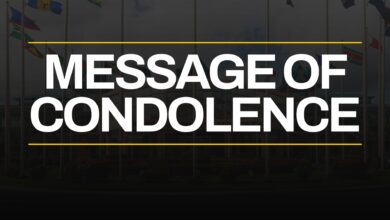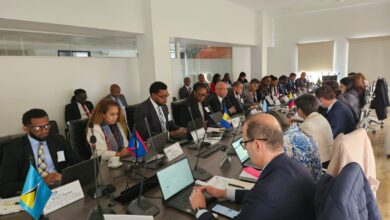LAMY AND CARICOM TRADE MINISTERS DISCUSS GLOBAL TRADE ROUND
CHRIST CHURCH, BARBADOS – In remarks before a gathering of CARICOM Trade Ministers in Georgetown, Guyana today (May 13), former European Union Trade Commissioner Pascal Lamy took stock of priorities for the World Trade Organization (WTO) Doha Round. In an exchange of views, it was underscored that it is important the Round focus in a meaningful way on development. In ensuring that development assumes a central place in global trade talks, Mr. Lamy called for the WTO to be more responsive to developing countries. He also stressed the importance of increased coordination and coherence between the WTO and the World Bank and International Monetary Fund.
CARICOM Ministerial Spokesperson on the WTO and Guyana’s Trade Minister Hon. Clement Rohee led the Ministerial interchange with Mr. Lamy, highlighting that for CARICOM preferences, Special Products, and special and differential treatment remain key issues at the forefront of the Region’s interests in on-going WTO talks.
“The Doha Round can only be judged a success to the extent that development permeates every aspect of the Agreement that is eventually clinched, and so the Caribbean is keen on seeing far-reaching development dividends emerge from Doha Round negotiations,” said the Director-General of the Caribbean Regional Negotiating Machinery (RNM), Ambassador Dr. Richard Bernal, in response to Mr. Lamy’s address. Ambassador Bernal underscored that such an outcome would be a key litmus test for the Round delivering on the objectives and philosophy which underpinned the launch of the Doha ‘Development’ Agenda at the Fourth WTO Ministerial in 2001.
Having learned that Mr. Lamy had successfully contested the race for the post of WTO Director General, Dr. Bernal offered his congratulations, adding he looked forward to Mr. Lamy’s stewardship of the WTO. “Over the years, CARICOM Countries have forged a strong working relationship with Mr. Lamy, having interfaced regularly with him in his capacity as European Union Trade Commissioner in various forums. Because of this, he is very well versed as regards the Region’s goals and priorities in global trade talks,” the top Caribbean trade official said. Ambassador Bernal also told Mr. Lamy that in taking up the top job at the WTO, he has the opportunity to transform the Geneva-based body from a purely rules-making, development neutral institution into one that is proactive in trade promotion, but also deeply committed to a strong development thrust. “The WTO must be supportive of development, as developing countries now account for two-thirds of its membership. Extending concessions in this regard, especially to the smallest and most vulnerable Members, must not be seen as a serious deviation from free trade at the multilateral level,” Ambassador Bernal added.
Lamy’s meeting with CARICOM Trade Ministers today was his first such encounter with WTO Member Trade Ministers, following the announcement that he had emerged as the winner of the Geneva-based consultative process to recommend a new Director General for the WTO. Coinciding with his address to the one-day consultation of CARICOM Trade Ministers, the Twelfth Special Council for Trade and Economic Development (COTED) on External Trade Negotiations, a recommendation was handed down at a Heads of Delegation (HoD) meeting in Geneva, by Chair of the WTO General Council Ambassador Amina Mohamed, that at the forthcoming May 26 to 27 meeting of the General Council, Members take a consensus decision to appoint Lamy (the candidate of France) as the next WTO Director General.
Mohamed cited Lamy as “the candidate most likely of the two to attract consensus.” Lamy’s challenger at this late stage of the race, Ambassador Carlos Pérez del Castillo – a former Uruguayan trade envoy – apparently lacked the requisite support from WTO Members. In congratulating Lamy, who with the blessing of Members at the General Council meeting at month’s end is poised to clinch the top WTO post, Castillo signalled his intention earlier today to request his government withdraw his candidacy.
Luiz Felipe de Seixas Corrêa of Brazil and Jaya Krishna Cuttaree of Mauritius were also vying for the top WTO post; however, when it was determined their candidatures were least likely to attract consensus, they withdrew from the race in the first and second round of consultations, respectively.
Reflecting on the assessment of breadth and depth of support, Mohamed said in all three rounds of consultations with individual Members, not country groupings, “the distribution of preferences across geographic regions and among the categories of Members…..least developed countries (LDCs), developing countries and developed countries” were considered. Mohamed highlighted that in the final round of the selection process, a “clear picture” of the will of WTO Members had emerged, as evidenced by expressions of preferences and breadth of support. As with the two previous rounds of consultations, in this final round, all delegations were invited to respond to the question: “What are your preferences?”
Mohamed indicated further, that by May 12 the views from the total membership of 148 had been received. “Of these, 126 are Geneva-based, and 22 are non-resident delegations,” Mohamed added, in her May 13 HoD Statement. Paying tribute to all the candidates and their “great stature, background and experience”, the General Council Chair emphasized that ultimately the decision on the new WTO chief belongs to the Members.
Out-going WTO Director General Dr. Supachai Panichpakdi’s term expires on August 31, 2005. His successor’s term of office is set to begin September 1, 2005, for a period of four years. Occupying the new Director General’s attention, when he assumes office, will be the Sixth WTO Ministerial, slated for Hong Kong in December. Already, circumspect predictions have been made by Panichpakdi as regards the Doha Round process in the lead up to this critically important Ministerial. In remarks May 4, Panichpakdi urged WTO Trade Ministers to “provide essential impetus to the work in Geneva”; warning that “convergence is not built overnight, and time is running out quickly.” Providing a state-of-play of several negotiating issues, Panichpakdi described the “overall picture” as cause for concern. Suggesting flagging negotiations are poised on a very fine balance, he underscored that if progress is not made in the near term, especially in Agriculture, then “we may not be able to stop the balance from tilting us backwards. This may have severe consequences not just for our ambitions for Hong Kong but for the Round overall.”
For his part, Panitchpakdi has been appointed to lead the United Nations Conference on Trade and Development (UNCTAD) for the next four years, beginning September 1, 2005. That appointment was confirmed Wednesday, May 11.
In an effort to make a recommendation on the next head of the WTO as required under the Procedures agreed in 2002, General Council Chair Mohamed has led a three-person selection panel that over the last two months has held closed-door consultations with WTO Members. The other two members of the panel are Ambassador Glenne (Norway), Chair of the Dispute Settlement Body, and Ambassador Stephenson (Canada), Chair of the Trade Policy Review Body, serving as Facilitators. Beginning May 9, the third and final round of the WTO Director General selection process concluded yesterday. Based on a revised slate of candidates announced at a HoD meeting April 29, the final stage of the WTO Director General selection process pitted Lamy against Castillo.
Press ReleasesTradeWorld Trade Organisation





